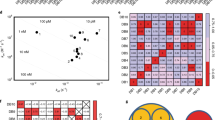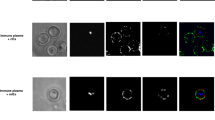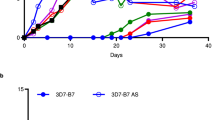Abstract
An important feature of Plasmodium falciparum malaria which differentiates it from other human malarias is that erythrocytes infected with trophozoites and schizonts are not present in the peripheral blood but are sequestered along capillary and venular endothelium1. Infected erythrocytes attach via parasite-induced ultrastructural modifications on the surface of the infected cells, called ‘knobs’2,3. This sequestration may be important for parasite survival because it prevents infected erythrocytes from circulating through the spleen where they could be eliminated. We have established an in vitro correlate of sequestration and used it to demonstrate that immune sera from repeatedly infected Aotus monkeys inhibit binding of infected erythrocytes to endothelial cells4. We have investigated whether antiserum that blocks binding of one isolate of P. falciparum to target cells can block or reverse binding of other isolates. We report here that sera which block or reverse binding are strain-specific, indicating that the corresponding antigens on the surface of the infected erythrocytes are strain (isolate)-specific.
This is a preview of subscription content, access via your institution
Access options
Subscribe to this journal
Receive 51 print issues and online access
$199.00 per year
only $3.90 per issue
Buy this article
- Purchase on Springer Link
- Instant access to full article PDF
Prices may be subject to local taxes which are calculated during checkout
Similar content being viewed by others
References
Miller, L. H. Am. J. trop. Med. Hyg. 18, 860–965 (1969).
Rudzinska, M. A. & Trager, W. J. Protozool. 15, 73–88 (1968).
Luse, S. A. & Miller, L. H. Am. J. trop. Med. Hyg. 20, 655–660 (1971).
Udeinya, I. J., Schmidt, J. A., Aikawa, M., Miller, L. H. & Green, I. Science 212, 555–557 (1981).
Schmidt, J. A. et al. J. clin. Invest. 70, 379–386 (1982).
Wilson, R. J. M., McGregor, I. A., Hall, P., Williams, K. & Bartholomew, R. Lancet ii, 201–205 (1969).
Wilson, R. J. M. Nature 284, 451–452 (1980).
Wilson, R. J. M. & Phillips, R. S. Nature 263, 132–134 (1976).
McBride, J. S., Walliker, D. & Morgan, G. Science 217, 254–257 (1982).
Hommel, M., David, P. H. & Oligino, L. J. exp. Med. 157, 1137–1148 (1983).
David, P. H., Hommel, M., Miller, L. H., Udeinya, I. J. & Oligino, L. D. Proc. natn. Acad. Sci. U.S.A. (in the press).
James, S. P., Nicol, W. D. & Shute, P. G. Proc. R. Soc. Med. 25, 1153–1186 (1932).
Langreth, S. & Reese, R. T. J. exp. Med. 150, 1241–1254 (1979).
Trager, W. & Jensen, J. B. Science 193, 673–675 (1976).
Author information
Authors and Affiliations
Rights and permissions
About this article
Cite this article
Udeinya, I., Miller, L., McGregor, I. et al. Plasmodium falciparum strain-specific antibody blocks binding of infected erythrocytes to amelanotic melanoma cells. Nature 303, 429–431 (1983). https://doi.org/10.1038/303429a0
Received:
Accepted:
Issue Date:
DOI: https://doi.org/10.1038/303429a0
This article is cited by
-
Age-dependent increase in antibodies that inhibit Plasmodium falciparum adhesion to a subset of endothelial receptors
Malaria Journal (2019)
-
Surface antigens of Plasmodium falciparum-infected erythrocytes as immune targets and malaria vaccine candidates
Cellular and Molecular Life Sciences (2014)
-
Maternal antibodies block malaria
Nature (1998)
-
Antigenic variation and immune evasion in Plasmodium falciparum malaria
Immunology & Cell Biology (1996)
-
Cytoadherence of knobless Plasmodium falciparum-infected erythrocytes and its inhibition by a human monoclonal antibody
Nature (1989)
Comments
By submitting a comment you agree to abide by our Terms and Community Guidelines. If you find something abusive or that does not comply with our terms or guidelines please flag it as inappropriate.



